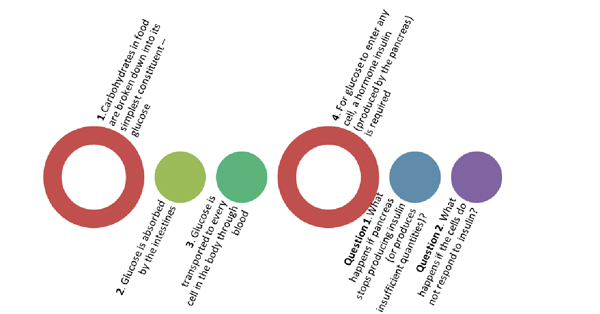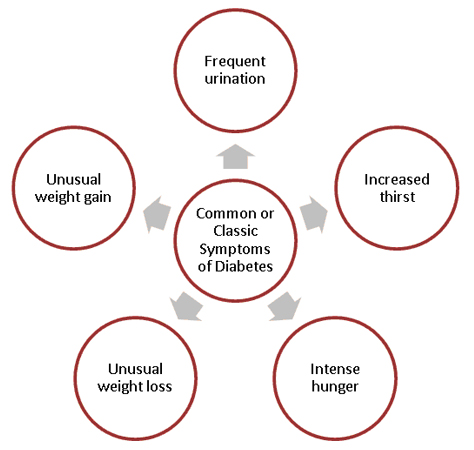
Diabetes mellitus, or simply, diabetes, is a group of disorders of metabolism. In this disorder, the person has high levels of glucose in the blood which remains unavailable to the cells and is passed off from the body through urine. The name itself means "sweet urine," coined when physicians found out that urine of some (diabetic) patients attracted ants!
A Quick Review - of what you learnt at school

Answer (to both questions): In the absence of insulin, the glucose is unavailable to the cells and it simply accumulates in the blood. Glucose is the primary source of energy for our body cells and if it is unavailable, it causes all sorts of complications. This bad karma is called diabet es.
Let's Look at the Different Types of Diabetes
1. Type 1 Diabetes: Also known as insulin-dependent diabetes, or juvenile diabetes or early-onset diabetes, this type is seen in about 10% of diabetics. This is an autoimmune disorder in which the body's immune system destroys the beta cells of the pancreas, which are responsible for the production of insulin. The person's pancreas does not produce any insulin and the person has to rely on injected insulin for the rest of his/her life.
2. Type 2 Diabetes: This is the most common form of diabetes and is seen in approximately 90% of diabetics worldwide. In this disorder, body cells do not respond to insulin and eventually, the production of insulin may also decline.
3. Gestational Diabetes: This only affects pregnant females.
Why Does Anyone Get Diabetes?
Not So Sweet |


It is difficult to pinpoint the causes of this complicated disorder. Heredity plays an important role in the development of diabetes as does race. It is found that people from the Middle East, Africa and South East Asia are at a greater risk of getting diabetes than others.
Besides these common symptoms, a few other symptoms (not specific to the disorder) are:
1. Blurred eyesight
2. Fatigue
3. Headache
4. Irritability
5. Cuts And Wounds that take an unusually long time to heal
6. Itchy Skin
7. Sexual Dysfunction In Men
The primary problem associated with diabetes is the sudden rise in blood glucose levels, called hyperglycemia. This can manifest by symptoms that include shakiness, anxiety, palpitations, abdominal discomfort, etc.
How Can You Cure Diabetes?
Diabetes cannot be cured by taking drugs, but it can be very well managed. In many cases, type 2 diabetes has been completely reversed through lifestyle modifications. Regular uptake of insulin in case of type 1 diabetes, a healthy eating and exercise plan, periodic checking of blood glucose levels, giving up of smoking and alcohol consumption are all part of a management strategy for diabetes.
Diabetes is spreading like a pandemic. Estimates suggest that as many as 382 million people in the world suffered from diabetes in 2013. Researchers and scientists foresee diabetes as the seventh leading cause of death by the year 2030.
But, all is not lost yet. While type 1 diabetes can not be prevented, type 2 can. All it needs is a change in our current lifestyle and a motivation for leading a healthier life.







